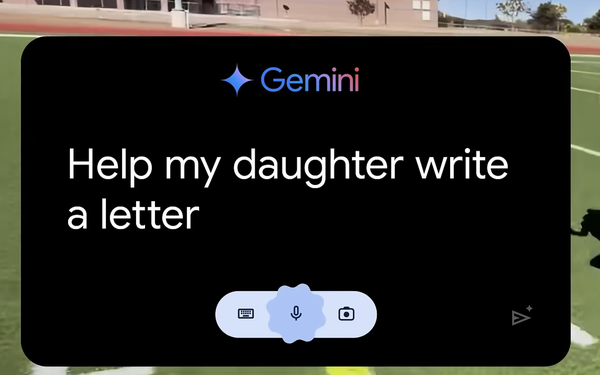Commentary
Google's 'Dear Sydney' Gets the Apple 'Crush!' Treatment
- by Barbara Lippert , Columnist, August 5, 2024

I’d say it was yanked. But the corporate colossus known as Google chose more machine-like words to announce that its Gemini-AI-pushing “Dear Sydney” commercial was being pulled.
“While the ad tested well before airing,” a spokesperson announced dryly in a release, “given the feedback, we have decided to phase the ad out of our Olympics rotation.”
Wow. Did a chatbot write this? Because the “feedback” contained enough human rage that if the spot had been a frog, it would have been boiled alive. As it was, the tech giant had to shut down the nasty comments on You Tube.
Pundits and media people weighed in, too. “This ad makes me want to throw a sledgehammer into the television every time I see it,” wrote Alexandra Petri in The Washington Post.
advertisement
advertisement
So how did an essentially sweet and good-looking spot (based on a true story) about a dad who helps his cute young runner and would-be-hurdler daughter compose a fan letter to her idol, American track and field star Sydney McLaughlin-Levrone, become the object of so much ire?
In the spot, even though he says he’s “pretty good with words,” the dad decides the missive has to be “just right,” so he calls on the gods of AI for guidance.
He gives Gemini this prompt: "Help my daughter write a letter telling Sydney McLaughlin-Levrone how inspiring she is and be sure to mention that my daughter plans on breaking her world record ... one day. (She says sorry, not sorry.)"
The outrage started with a blogpost from media/tech guru Shelly Palmer with the title “Why Google's 'Dear Sydney' Ad Makes Me Want to Scream." Palmer noted that a letter like this must be heartfelt and from the kid herself, and getting help from AI makes bad use of the application.
As Palmer later said in an interview,“The father in the video is not encouraging his daughter to learn to express herself.”
He added in his blog that “As more… people rely on AI to generate their content, it is easy to imagine a future where the richness of human language and culture erode."
The Washington Post’s Petri, who tends to write witty, satirical pieces about politics and rarely opines on advertising, went bonkers on the Google spot. In a column titled, “I Hate the Google Dear Sydney Ad More With Every Passing Minute,“ she writes, “Amazingly, this is an ad for the Gemini AI. Not an ad made by Google’s detractors in the hopes of getting us all to rise up with pitchforks and shut the whole thing down."
She adds, “Do you know what writing is? If the little girl in the commercial knows that she wants to say sorry-not-sorry for breaking Sydney McLaughlin-Levrone’s records someday, she already has more to say than Gemini ever will. What about Sydney inspires you? Why do you want to write to her? How do you want to be? Gemini doesn’t know any of these things.”
By the way, bots are humorless, but there was a Google ad for "Gemini in Google Docs" placed above Petri's online “I Hate the Google Ad” column.
The rising up with pitchforks bit reminded me of the response to Apple’s “Crush!” commercial, which offended everybody and also had to be pulled.
People hated it with the heat of a thousand suns because it showed art, music, and the various joys of human civilization being crushed into the thinnest iPad (with AI capability) that Apple had ever made.
Another common denominator: both the Apple and Google spots were created in-house. Perhaps in each case the team was so determined to sell the device that they were blind and tone-deaf to where consumers stood on the subject, with hostility and fears about a job-killing robotic future.
And maybe this is a selling angle for agencies of record: that in-house work is necessarily too inside-the-bubble (considering that tech titans have made multibillion-dollar bets on AI) to consider consumer resistance.
Still, I was surprised that Google actually pulled “Dear Sydney,” since it had pushed back to the hostility with statements about Gemini’s use as a “thought-starter.”
But to have a future, we have to teach our kids how to write, so they can also learn how to think. That’s the beautiful human-based magic, in art and sport.




Gemini, help me write a letter to politicians asking why they are funding school bureaucracies producing kids who aren't sufficiently literate to write simple letters
Well I hope the name 'Milton Friedman' pops up and his 1960's papers that were based around free-market policies. On paper it seemed good. I think that 60 years later we see the damage of reducing government taxation and therefore needed to reduced expenditures such as education, health, water supply etc. and resulted in big businesses becoming huge businesses.
Thank you for the good points, Kevin and John.